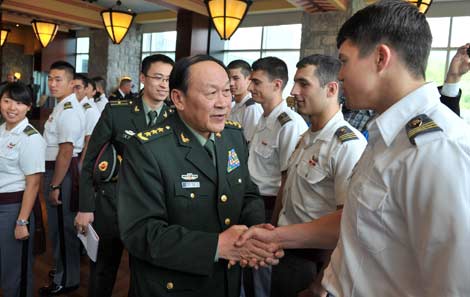West Point cadets greet Liang in Mandarin
Updated: 2012-05-12 08:02
By Tan Yingzi in West Point, New York (China Daily)
|
||||||||
|
 Defense Minister Liang Guanglie visits the United States Military Academy at West Point, in New York state, on Thursday. [Wang Lei / Xinhua] |
Connie Chen had been expecting a meeting with Defense Minister Liang Guanglie for two weeks.
The senior at the United States Military Academy at West Point was among two dozen Mandarin-speaking cadets chosen to greet the visiting Chinese military leader on Thursday morning at the campus' Jefferson Hall Library.
"I am pretty excited," Chen told China Daily. "It's very rare."
Liang is the first Chinese defense minister to visit the US in nine years. A trip planned for 2011 was postponed after Washington announced it would sell weapons to Taiwan, a move Beijing strongly opposes.
Liang's weeklong visit was capped by Thursday's stop at West Point, the main training academy for US Army officers.
When the general arrived at the library, he shook hands with each cadet waiting in line and asked about their hometowns, Chinese-language studies and career plans. He also gave each a souvenir - a personal pin bearing his name and the insignia of the Chinese People's Liberation Army.
Thursday was Liang's second visit to West Point; on his first, in 2004, he was taken with the school's advanced teaching and research capabilities.
"I was very impressed last time, so I asked to come here again," the general told the students.
West Point, whose hilly campus along the Hudson River is about an hour's drive north of New York City, has exchange programs with China's PLA University of Science and Technology in Nanjing, Jiangsu province.
This time Liang brought from China a collection of books and videos, in Mandarin and English, to the library, to add to the future officers' knowledge and understanding of Chinese history, culture and military development.
The books included The Wisdom of Sun Tzu, History as a Mirror and Chinese Ancient Military Strategies.
In exchange, US Army Lieutenant General David Huntoon, superintendent of West Point, presented Liang with a shako - ceremonial headgear worn by cadets in full dress.
"We thank you very much for your effort to build mutual trust and cooperation between the United States and China," Huntoon told his guest.
"This visit is very successful and it has deepened the understanding between our two militaries, and enhanced our mutual trust and cooperation," Liang said. "We also witnessed the achievement of US military modernization."
Since May 4, the minister has visited the US Naval Base in San Diego; met with Defense Secretary Leon Panetta and Deputy Secretary of State William Burns in Washington; and visited military bases in Florida, Georgia and North Carolina.
According to the Chinese delegation, Liang's talks with US officials covered issues including the South China Sea, cybersecurity and US military deployment in the Asia-Pacific region.
Liang expressed Beijing's will to develop a sound relationship with the US military and enhance communication and exchanges between the two sides.
He also asked his US hosts to respect Beijing's core interests and major concerns, such as arms sales to Taiwan, US surveillance flights near Chinese coastlines and controls on technology exports, which Beijing considers discriminatory.
In addition, the minister met representatives of the Flying Tigers, pilots who helped China fight Japanese forces in World War II; lunched with US Marines; and watched the training of new soldiers.
Liang's contacts and meetings with American soldiers and people show that "China cherishes the historic communication and friendship with the US side and its sincerity to promote Sino-US relations," said an officer with the foreign affairs office of the defense ministry accompanying Liang for the visit, Xinhua News Agency reported.
Liang's West Point stop wrapped up his six-day visit in the US starting on May 4, which, analysts said, has promoted trust and cooperation between the two militaries.
The visit is an implementation of the consensus reached by the two countries' leaders, and has promoted mutual trust and pragmatic cooperation between the two militaries, Xinhua quoted the officer as saying.
"It is the general trend of history that China and the US, as well as their militaries, take responsibility for peace, stability and prosperity in the region," said Wang Xinjun, a researcher on defense policies with the Academy of Military Sciences.
"Though it's impossible for China and the US to agree on every issue, dialogue between the two militaries can avoid any dangers resulting from misjudgments of each other's intentions," Wang wrote in a recently published article.
The Pacific Ocean is broad enough to hold China and the US, as well as other regional countries, said Wang, adding, "A cooperative bilateral relationship is very necessary for the security of the Asia-Pacific region and the future of the two countries."
Cheng Guangjin in Beijing contributed to this story.
Contact the writer at tanyingzi@chinadailyusa.com

 Relief reaches isolated village
Relief reaches isolated village
 Rainfall poses new threats to quake-hit region
Rainfall poses new threats to quake-hit region
 Funerals begin for Boston bombing victims
Funerals begin for Boston bombing victims
 Quake takeaway from China's Air Force
Quake takeaway from China's Air Force
 Obama celebrates young inventors at science fair
Obama celebrates young inventors at science fair
 Earth Day marked around the world
Earth Day marked around the world
 Volunteer team helping students find sense of normalcy
Volunteer team helping students find sense of normalcy
 Ethnic groups quick to join rescue efforts
Ethnic groups quick to join rescue efforts
Most Viewed
Editor's Picks

|

|

|

|

|

|
Today's Top News
Health new priority for quake zone
Xi meets US top military officer
Japan's boats driven out of Diaoyu
China mulls online shopping legislation
Bird flu death toll rises to 22
Putin appoints new ambassador to China
Japanese ships blocked from Diaoyu Islands
Inspired by Guan, more Chinese pick up golf
US Weekly

|

|







